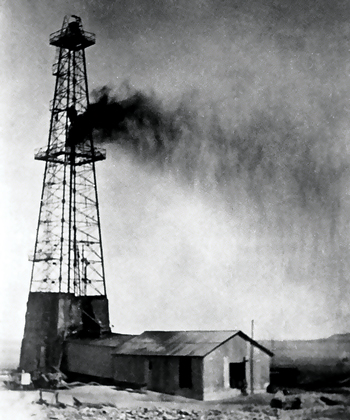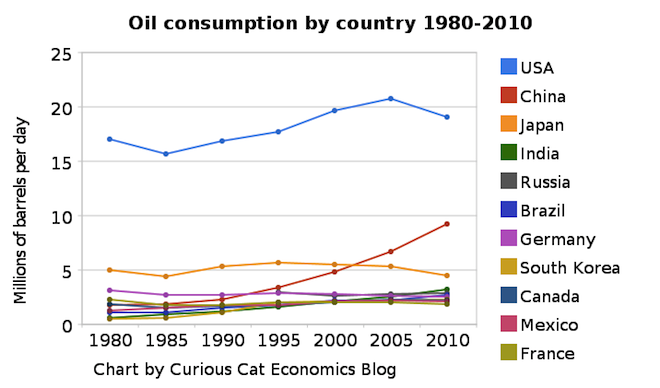Also - one thing that rarely comes up in this debate which I feel is important to point out:
The heart of modern, Wahhabi Islam, the Arabian peninsula, does
not have a history of colonial oppression. The Arabian peninsula is where Mohammed's followers originally coalesced, and it remained an Islamic-ruled state, either under the rule of a larger Caliphate, or under a localized polity like the Sharifate of Mecca, up until Ottoman times - after which the state which is now known as Saudi Arabia came into existence. So there was never any direct European colonial oppression - or even Ottoman oppression - going on in the Arabian peninsula.
The Arabian penisula was basically just a locally-ruled state, of little importance beyond its historical association with the founding of Islam, and the fact that it was home to the holy city of Mecca.
...
But then this happened:

Of course, even before the oil, the Arabian peninsula had always been important in the world of Islam - it was the home of the holy mosques of Mecca and Medina, and a major pilgrimage destination due to the Hajj. But politically speaking, it had always been eclipsed by greater regional powers, either the great Caliphate centered around Baghdad in the Middle Ages, or the Ottomans in Istanbul during the 17th through 20th centuries. But once oil was discovered in the 1930s, suddenly the Arabian peninsula became absurdly influential. And suddenly, the obscure, relatively little-known Islamic sect of Wahhabbism suddenly became officially backed by billions of dollars of oil revenues. This is seriously as crazy as if some crazy fundamentalist Baptist church in the heart of Alabama suddenly came into possession of 90% of Microsoft shares.
And
this, in my opinion, more so than Western meddling (again, the Arabian peninsula has no colonial history), is directly or indirectly the major reason for many (at least, let's say 60%) of the current problems facing the Middle East. Untold billions of dollars flow out of Saudi Arabia and into the hands of Jihadists, who in turn are the product of Saudi-funded madrasahs throughout the region. Ironically, most Jihadists actually aim to overthrow the Saudi monarchy itself and replace it with some sort of wacky Caliphate or other, but this is one of those hilarious unintended consequences of cultivating extremism, and also attributable to the fact that the "house of Saud" is in fact not a single monolithic billionaire, but rather hundreds of multi-millionaires whose interests range from funding the latest Silicon-Valley startups to providing ISIS with more rocket launchers.
The second largest problem in the Mideast is of course the Sunni/Shia divide, which plays out mostly in Iraq, and is essentially a proxy-war between the Wahhabist Saudi Arabia and Shia Iran and their respective oil reserves (which in turn plays out on the world stage as proxy-wars between the US and Russia/China).
The point is - Sam Harris may be simplifying the situation, but I think his opponents
over-emphasize the legacy of colonialism and the 20th century American political interference in the region. The worst, in terms of long-term damage, act of foreign interference in the region, by far, was the creation of the state of Israel by the UK after World War 2. But in terms of
what's happening right now - certainly Sam Harris's opponents are seriously downplaying the
entirely native role of Saudi-backed Wahhabism, and the absolute plague it has brought upon that region. Yes, the US is like 99% responsible for the current horrible mess in Iraq - but that is just the tip of the iceberg. The US merely waltzed into the region, guns blazing, and fumbled around like an incompetent idiot, trying ineptly to forge a new state while inadvertently opening the floodgates of endless sectarian violence (which Saddam had skillfully kept in check via an oil-funded police state of his own.)



